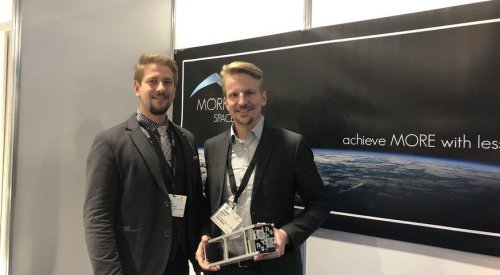BREMEN, Germany – German propulsion startup Morpheus Space won a U.S. Air Force Small Business Innovation Research contract and a NASA Jet Propulsion Laboratory purchase order after participating in the Techstars Starburst Space Accelerator.
The accelerator gave Morpheus “a real boost,” Daniel Bock, Morpheus CEO and co-founder, said at the Space Tech Expo Europe here.“We came to the United States with no network and met many important people.”
Morpheus was one of ten companies in the first cohort of the Los Angeles-based Techstars Starburst Space Accelerator, a three-month program that began in July. The Techstars Starburst accelerator is backed by the U.S. Air Force, NASA’s Jet Propulsion Laboratory, Lockheed Martin, Maxar Technologies, SAIC and Israel Aerospace Industries North America.
One significant outcome of the accelerator was JPL’s plan to purchase Morpheus thrusters. “They want to test and qualify them for future NASA missions,” István Lőrincz, Morpheus co-founder and chief business officer, told SpaceNews. “That is unbelievably great.”
In addition, Morpheus won a Small Business Innovation Research Phase 1 contract from AFWERX, an Air Force organization focused on innovation. Morpheus declined to comment on the value of the award.
The Aerospace Corp. also selected Morpheus thrusters as an enabling technology for Solar Gravity Lens, an ambitious mission being studied by Aerospace and JPL to send a swarm of spacecraft outside the solar system to view exoplanets.
“They needed thrusters that could survive for decades and then be reliably turned on,” Lőrincz said.
“This is just the top of the iceberg,” Lőrincz said. “We got introduced to a lot of very important prospects for us. We grew our customer pipeline significantly.”
As it pursues those prospects, Morpheus is preparing to open an office in Los Angeles in 2020.
Morpheus is a spinoff from the Technical University Dresden Institute of Aerospace Engineering. Earlier this year, Morpheus demonstrated its Nano Field Effect Electric Propulsion (NanoFEEP) thruster for the first time in orbit on the University Würzburg Experimental-4 cubesat. Morpheus also produces MultiFEEP thrusters that combines seven NanoFEEP thrusters with additional features for thrust vectoring.
- 30 Years in Space: a look at SpaceNews’ legacy
- Techstars and Starburst unveil space startup accelerator
- SN Military.Space | Who’s who in the national security space workforce • Doubts raised about cost of Space Force • U.S., Brazil to share space data
- Why Sierra Nevada’s owners are betting big on Dream Chaser
- SpaceX takes top honors in SpaceNews Awards for Excellence & Innovation
Share with your friends

(0) Comments
This article comments are currently no :(